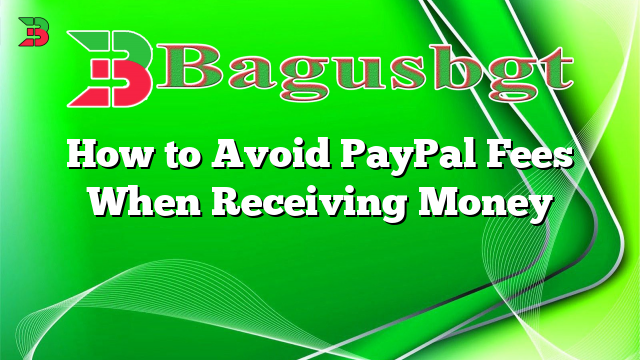Hello! Welcome to our guide on how to avoid PayPal fees when receiving money. PayPal is a widely used online payment platform that provides a convenient way to send and receive funds. However, PayPal charges fees for certain transactions, and these fees can add up over time. In this article, we will explore various strategies to help you minimize or even eliminate those fees.
1. Choose the Right Account Type
PayPal offers different types of accounts, including Personal, Premier, and Business. If you are an individual or a small business owner, it is recommended to choose the Personal or Premier account. While the Premier account has some additional features, both of these account types allow you to receive money without any fees.
However, if you opt for the Business account, PayPal charges transaction fees ranging from 2.9% to 3.9% plus a fixed fee per transaction. Therefore, it’s essential to select the account type that best suits your needs to avoid unnecessary fees.
2. Request Payments as “Friends and Family”
When receiving money through PayPal, you have the option to request payments as “Goods and Services” or “Friends and Family.” By selecting the latter, you can avoid transaction fees altogether. However, keep in mind that this option is intended for non-commercial transactions, such as sending money to friends or family members.
If you frequently receive payments for goods or services, it is advisable to use the “Goods and Services” option to maintain transparency and abide by PayPal’s terms of service. In such cases, the following strategies will help you minimize fees.
3. Negotiate Lower Fees with Clients
If you receive regular payments from clients or customers, it is worth discussing the possibility of sharing or reducing the PayPal fees. Some clients may be willing to bear the transaction fees themselves or explore alternative payment methods that do not involve fees.
Openly communicating with your clients about the impact of PayPal fees on your business can lead to mutually beneficial solutions that help you avoid or minimize these charges.
4. Utilize PayPal’s Micropayments Rate
If you receive payments for small transactions, PayPal offers a Micropayments rate that can significantly reduce fees. This rate applies to payments under $10 and charges a fee of 5% plus a fixed fee per transaction, which is generally lower than the standard rates.
To qualify for the Micropayments rate, you need to contact PayPal’s customer support and request the activation of this feature. Once enabled, you can enjoy lower fees for eligible transactions.
5. Offer Discounts for Alternative Payment Methods
Consider incentivizing your customers to use alternative payment methods that do not involve PayPal fees. For example, you can provide a small discount or exclusive offers for customers who choose to pay via bank transfer, direct deposit, or other fee-free options.
By encouraging customers to use alternative payment methods, you can reduce the volume of PayPal transactions and consequently decrease the associated fees.
6. Utilize PayPal Referral Program
PayPal has a referral program that allows you to earn credits or cashback for referring new users to PayPal. By referring individuals or businesses who are not yet using PayPal, you can earn rewards that offset your transaction fees.
Take advantage of this program by sharing your unique referral link with your network or promoting it on your website or social media platforms. These referrals can help you earn credits toward future PayPal fees.
7. Consider International Bank Transfers
For international transactions, PayPal charges additional fees for currency conversion, cross-border transfers, and withdrawal to bank accounts in different countries. If possible, explore the option of receiving funds through direct international bank transfers.
While international bank transfers may involve their own fees, they can sometimes be more cost-effective compared to PayPal’s international transaction fees. Research and compare the fees associated with both options to determine the most suitable method for your specific situation.
8. Optimize Your Pricing Strategy
If you frequently receive payments for goods or services, consider factoring the PayPal fees into your pricing strategy. By adjusting your prices accordingly, you can ensure that the fees are covered without significantly impacting your profit margins.
Calculate the average PayPal fees you incur and incorporate them into your pricing structure to avoid absorbing these costs.
9. Automate Payments with PayPal Subscriptions
If you offer recurring services or subscriptions, consider utilizing PayPal’s subscription feature. This feature allows you to automate regular payments from your customers, reducing the need for individual transactions and associated fees.
By setting up PayPal subscriptions, you can streamline your payment process and minimize the fees involved.
10. Regularly Review PayPal’s Fee Structure
PayPal’s fee structure may change over time, so it is crucial to stay updated on any modifications. Regularly review PayPal’s fee schedule and terms of service to ensure you are aware of the latest rates and potential fee-saving opportunities.
Alternative Ways to Avoid PayPal Fees When Receiving Money
While PayPal is a popular payment platform, it is not the only option available. Here are a few alternatives that can help you avoid PayPal fees:
- Venmo: Owned by PayPal, Venmo offers fee-free transfers between Venmo accounts and bank accounts.
- Google Pay: With Google Pay, you can send and receive money without any fees.
- Zelle: Zelle allows fee-free bank transfers between participating banks.
- Square: Square offers payment processing services with competitive rates and fee structures.
FAQ
| Question | Answer |
|---|---|
| Q: Does PayPal charge fees for receiving money? | A: Yes, PayPal charges fees for certain transactions, including receiving money for goods and services. |
| Q: Can I avoid PayPal fees completely? | A: While it may not be possible to avoid all fees, there are strategies you can implement to minimize or eliminate PayPal fees. |
| Q: How can I request payments as “Friends and Family”? | A: When sending a payment request, choose the option to request money from friends or family members to avoid fees. |
| Q: Are there any alternatives to PayPal? | A: Yes, there are various payment platforms like Venmo, Google Pay, Zelle, and Square that offer fee-free or low-cost alternatives to PayPal. |
Conclusion
Avoiding PayPal fees when receiving money is possible with careful planning and utilizing the right strategies. By choosing the appropriate account type, requesting payments as “Friends and Family,” negotiating with clients, and exploring alternative payment platforms, you can significantly reduce or eliminate these fees. Regularly reviewing PayPal’s fee structure and staying updated on available options will ensure you stay informed and make the most cost-effective decisions for your business or personal transactions. Remember, every saved dollar adds up in the long run!
 Bagus Banget Kumpulan Informasi terbaru dari berbagai sumber yang terpercaya
Bagus Banget Kumpulan Informasi terbaru dari berbagai sumber yang terpercaya





